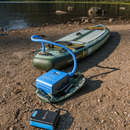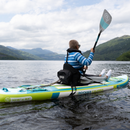Paddle Boarding Beats Netflix for Lowering Stress—Seriously!

Here’s a little secret: self-love isn’t just about bubble baths or Netflix marathons. It’s about taking care of your body, too—and that means keeping your cortisol levels in check. Cortisol is the stress hormone, and when it’s high, it can mess with your sleep, mood, and even make you gain weight. Not exactly the glow-up you’re after, right?
Here’s the kicker: while Netflix might seem like the perfect way to unwind, it can actually spike your cortisol if you're watching the wrong stuff. A feel-good comedy or nature documentary? Yes, those can help you chill. But a crime thriller or intense news? Your body responds by raising cortisol levels, which can lead to all kinds of unwanted side effects. So, what seems like “relaxation” might actually be doing more harm than good.

Now, if you want to actually relax and lower your cortisol, the best way is to spend time near water. Whether you’re paddle boarding, kayaking, or just soaking in the peaceful vibes by the beach, being out on the water works wonders. Want to level it up? Add some deep breathing or yoga on your board. It’s like triple the relaxation in one activity—and it brings long-term benefits for both your body and mind.
So, next time you need to de-stress, skip the binge and grab a paddle instead. Trust us, your cortisol levels (and your body) will thank you for it!
Here’s a short table that contrasts some of the lesser-known negative and positive effects of high and low cortisol levels:
High Cortisol(Negative Effects) |
Low Cortisol(Positive Effects) |
|
Impaired memory and cognitive function |
Sharper memory, better focus, and learning |
|
Increased skin aging (wrinkles, thinning skin) |
Healthier, more resilient skin |
|
Gut dysfunction (IBS, bloating) |
Better digestion, reduced bloating |
|
Hormonal Imbalances |
Balanced hormones |
|
Chronic inflammation and weakened immune system |
Stronger immunity, quicker recovery from illness |
|
Reduced muscle mass and bone density |
Improved muscle strength and bone health |
|
Higher blood pressure and heart strain |
Healthier heart, stable blood pressure |
|
Weakened ability to handle daily stress |
Improved emotional resilience and stress management |






